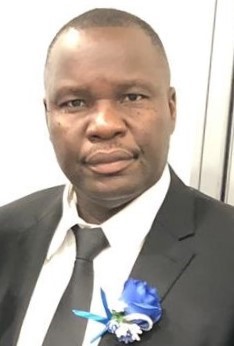Frantz Guerrier
Frantz Guerrier was born in Port-au-Prince at the end of the Francois Duvalier reign. His family came from the direct lines of the heroes of Haiti Independence from both sides, his mother (southern roots with Nicolas Geffrard) and his father(northern roots with Philippe Guerrier). Frantz studied in Peres Salesiens Primary school and went to Gerard Gourgue and Petit Seminaire College St.Martial. He then went on to the State University of Haiti at Faculte de Linguistique Appliquée in 1987 then at Ecole Normale Superieure where he earned a bachelor’s degree in Foreign Languages. He started teaching English, Spanish, and Haitian Creole in 1991 in various Institutions of the country. He taught at the following schools :Lycée Anacaona de Leogane,College Canado Haitien, Petit Seminaire College St Martial, College Frantz Paillere, Institution St.Louis de Gonzague, and Ecole Hoteliere d’Haiti etc.
After more than ten years of teaching in Haiti, Frantz Guerrier traveled to the United States of America where he earned another Bachelor’s degree in Applied Management at Medgar Evers College. He also earned Masters’degree at Brooklyn College and Hunter College in Spanish and Education. Frantz has been working in the Department of Education as a Teacher, Translator and Interpreter since 2002. He also taught Spanish and French in New York City and Nassau County Public Schools. He is currently working in the DOE and teaching in the City University of New York(CUNY).
In his spare time, Frantz writes poetry, novels, bilingual books and articles on diverse issues particularly immigration, racism and policy in the U.S, the Caribbean Islands and Latin America. His last exceedingly good book is a collection of bilingual poetry with the title of « Ordeals in Paradise/ Peripesi nan Paradi. » Frantz is actually writing a very intriguing novel on power and society in Latin America. He believes that his native country could never be destroyed despite the natural vicissitudes, multiple unrests, violent occupations and intrusions of western powers in its internal affairs. Furthermore, he emphasizes that Haiti has a strong culture and enormous resources; it has also the youngest and the most resilient people in the western hemisphere. Frantz describes Haiti as a country of poetry, a pool of cultures and an island of hope and traditions where everyone laughs about life despite the peaks and valleys that surround our sea of challenges where we swim.


